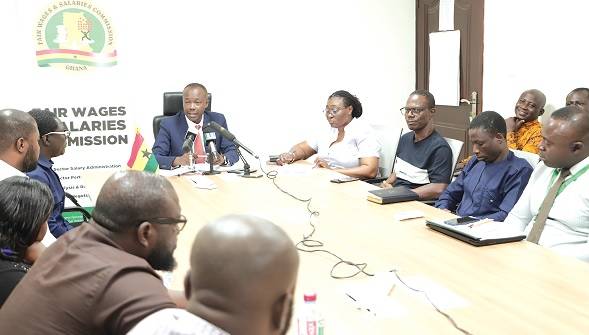The public sector wage bill has seen a significant reduction since the commencement of the Nationwide Payroll Monitoring exercise in April, this year, the Fair Wages and Salaries Commission (FWSC) has stated.
The Chief Executive Officer (CEO) of FWSC, Benjamin Arthur, at a press briefing in Accra yesterday disclosed that data from the Controller and Accountant General’s Department (CAGD) revealed that the total wage bill for just July and August reduced by over GH¢190 million.
He explained that the wage bill for July witnessed a six per cent reduction over that of June, resulting in a cost saving of GH¢178.36 million, while the bill reduced by one per cent in August over the previous month, also resulting in GH¢18.45 million savings.
Mr Arthur said the success had been largely through the public sensitisation when institutions started conducting their own assessments of the payrolls, paving the way for the FWSC to validate the public workers on the Single Spine Salary Structure.
However, he equally attributed part of the gains to the effective measures put in place by the CAGD to ensure that workers’ numbers were linked to their Ghana cards to help remove ghost names from the payroll.
Mr Arthur said the commission had conducted the initial monitoring exercise in 17 institutions in Accra with a staff strength of 5,759.
The National Commission on Civic Education (NCCE) had the highest number of employees of 1,751 with the Ghana Book Development Council having the least number of staff of 17.
Initial analysis of the exercise from the institutions provided evidence of a decline in their wage bill.
The CEO of FWSC disclosed that an analysis of the institutions’ payroll revealed that the wage bill had been reduced by an average of 1.2 per cent from April when the exercise began and had translated into money equivalent of GH¢36.11 million from April to August 2023.
The reduction was from anomalies detected at the institutions.
Explaining further, Mr Arthur said, for instance, “The wage bill increased to GH¢32.5 million in April 2023 and with the commencement of the payroll monitoring exercise, it declined to GH¢31.9 million”.
He said findings from eight institutions also found anomalies which could be rectified to save the country about GH¢252,188.38 per month.
Mr Arthur said the commission was yet to move to the bigger institutions and expressed the hope that the wage bill would significantly be reduced to enable the country to save more money for other developmental projects.
Anomalies detected
Touching on the anomalies, the CEO said FWSC had detected many cases of workers changing their ages to purportedly cheat the system.
“We found out that a number of people continue to change their dates of birth.
There are instances where an individual will be bearing about three to four dates of birth.
One on their payroll, another on their management data, one from the individual himself and other one from social security,” Mr Arthur stated.
He said, certainly, that caused an increase in the wage bill as staff who were supposed to go on retirement at an earlier date were maintained on the payroll for much longer periods than expected, thereby draining the coffers of the country and denying younger ones the opportunity to be employed.
Another anomaly, there were some persons with official accommodations and still taking accommodation allowance, others using official cars and still taking vehicle allowance, among others.
“Education and qualification fraud were also found, which inevitably caused increases to the wage bill through higher grades and salaries, which were not honestly earned by the identified workers as they did not merit to be placed on such levels,” he stated.
Mr Arthur added that some of the institutions had unapproved structures that were being used to unfairly place their staff at an advantage on the Single Spine Pay Policy (SSPP), resulting in higher salaries paid than what was negotiated.
The CEO commended the management of the institutions for their cooperation which had provided successful results so far.
Mr Arthur, however, called on them to delve deeper into the anomalies detected to save the country’s payroll from unearned salaries.
“As a matter of urgency, they are to take immediate steps to rectify all anomalies as indicated through the commission’s observation and findings before punitive measures were taken against them”.
Background
The payroll monitoring exercise which commenced in April, this year, is aimed at sanitising the Public Sector Payroll by identifying and expunging any existing fraud and anomalies on the payroll to ensure that only approved salaries and allowances were being paid to deserving beneficiaries.
A successful exercise was estimated to save the country an annual estimated 10 billion cedis from unearned salaries.




No comments yet
Be the first to share your thoughts!